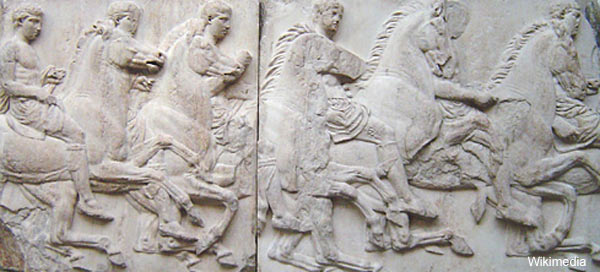Row heats up over the Parthenon Marbles
Hollywood actors George Clooney, Bill Murray and Matt Damon have become embroiled in one of the fiercest of all heritage controversies: should the Parthenon marbles be returned by the British Museum to Greece?
The actors were in London to promote their latest film, The Monuments Men, which was inspired by the true story of a team of soldiers on a mission to rescue valuable artwork stolen by the Nazis during the invasion of Europe. But they left implying that Britain too, needed to have a long, hard, look at itself.
Murray said: "It seems like it's a problem all over the world. Who owns this art? Where it came from? Do they have the right to give it back? I think it has had a very nice stay here, certainly. London's gotten crowded, there's plenty of room back there in Greece, plenty of room. England can take a lead on this kind of thing … letting art go back where it came from.”
Clooney also stated that Athens had a “very good case” to reclaim the 2500-year-old sculptures which were taken from the Parthenon in the early 19th century by the Earl of Elgin.
London Mayor Boris Johnson was quick to hit back in defence of Britain, claiming that Clooney was "advocating nothing less than the Hitlerian agenda for London's cultural treasures".
The Parthenon, the Temple of Athena, was built in 15 years between 447 to 432 BC, coordinated by the great Athenian statesman, Pericles, who began a huge program of building works to give Athens the magnificence of a great imperial city. In those few years, Greek literature, philosophy, architecture, and politics suddenly burst into flower.
In 1799, Lord Elgin was appointed British Ambassador to Constantinople. In receipt of a letter from the Sultan, he obtained permission to draw the Parthenon sculptures and produce replicas in plaster. Instead, Lord Elgin's team, after bribing the Turkish officer in charge of the Acropolis, proceeded to dismantle the building and the remove its prized sculptures. He then sold them to the British Government for £35,000.
Between 1930 and 1940, the Parthenon sculptures in the British Museum were cleaned with wire brush and acid, causing permanent destruction of their ancient surface. In 1983, Melina Mercouri, Minister of Culture for Greece, requested the return of the sculptures, and the debate over their return has raged ever since.
The Greek government and many historians demand they should be handed back because they claim the Earl committed ‘cultural vandalism’ and took them without proper authority. Indeed, the return of ‘Elgin’s loot’ is the single biggest priority on the arts agenda of the tourist-reliant country.
Culture Minister for Greece, Panos Panagiotopoulos, was quick to respond to the Hollywood actors’ support. He penned a two-page letter saying: "As you said, returning these pillaged masterpieces to where they belong on the Parthenon would be both fair and nice … not only because they belong to the history of Greek civilisation, but precisely because through our history they illuminate world civilisation."
There was, he continued, only one decision that could right the wrong. "The decision to return the marbles to the place where they were chiselled, next to those sculptures from which they were so illegally and violently ripped apart."
Greece has argued that its New Acropolis Museum is the perfect place to hold the marbles. In the new Museum, the Parthenon itself is visible through the windows of the room in which the marbles would be displayed together with the fragments that remained in Athens. At present, the Parthenon Gallery in the Acropolis Museum contains a combination of original marbles and cast copies of the pieces held in the British Museum, and observing the display one can’t help but feel that the marbles are not where they should be.

The Parthenon Gallery in the Acropolis Museum, Greece, which contains cast copies of the marbles.
However, the British Museum and those who want the marbles to remain argue they are part of human history and are preserved as well as viewed for free in the UK, which ‘legally bought’ them over 200 years ago. They have also said that returning the marbles would set a precedent which would suggest that cultural artefacts should, as a rule, be sent to the modern nation state occupying the land on which they were built or found.
It is unlikely that the British Museum will respond to Clooney’s call to return the marbles, but it might just add to the growing pressure that the Museum is under to give back one of Greece’s most prized possessions.
Featured image: A section of the Parthenon frieze. Photo credit.




















Comments
They were stolen and should be returned to their original owner. I don't know about English or Greek law but in the United States it's illegal to purchase stolen items. So regardless of what the Greek government will or won't sell, destroy, ect.,, it's their property to do with what they decide to do with. I think it's admirable that England had them on display but how would they feel if someone stole all of Shakespeare's work and wouldn't return it. The right thing is to send it all back to Greece and maybe they would let England display the copies. The art should go home so that Greeks can appreciate their heritage
The English Empire was also huge at one time, but all achieved by stealing from other countries and enslaving its people. It follows that at this times, the English would condone such thievery as that is their nature. Since nothing really belongs to them, and if they were to return everything they have stolen, art museums in England would have nothing to display. It would therefore be unlikely that they would return what they looted from Greece as that would create precedent for other countries to ask what was stolen form them.
First of all thank you for calling me , together with million of others, a fool.
If having values that makes me a responsible person in life , disobey to unethical without values people that want only to get richer, that inspire me to be an active person for our society and be against any kind of theft, to criticize what is wrong and what is not fair, to protect the human history and all it's achievements in a proper way, if all these are acts of a fool then YES I am proud to be a fool and I will be trying my best to be a fool till I will die. But every night when I go to sleep I know in my heart and my brain that there are things to fight for.
If what you just said makes you excusing your self and feel better for accepting things as they are, for letting rich people and thieves do whatever they want like stealing history and destroying monuments ,then my friend I feel happy for you because you can sleep every night with these thoughts. The rest of us , and I ensure you we are the majority, we will keep fighting for justice.
Also be stealing or destroying monuments you don't differ at all from these extremist religious people that don't respect history and arts.
Just because items were made in a certain place, does not mean they belong to the country that now claims that land. The Greek empire was huge and to say these items belong to the Greek people is so foolish. The items belong to the past and to human history. Imagine if all the items went back to the countries that they were found in. Look at all those museums in the Middle East that are robbed and ransacked by the general public and have all that history destroyed. Some cultures don't have respect for the past if any of it conflicts their stupid religious beliefs.
Good point Themis.
Pages